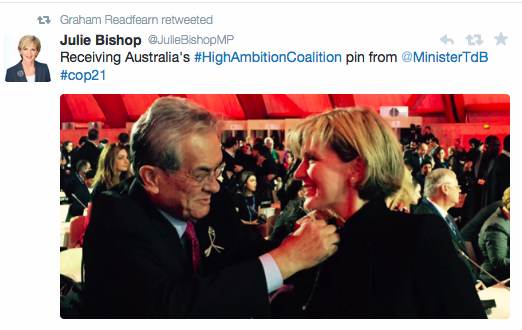In the final, frantic, virtually sleepless hours in Paris before the global climate deal was finalised on Saturday, Australia found itself on the outer of a powerful international movement.
Canada, once joined at the hip with Australia as one of the developed world’s two “climate dunces”, signed up to the Coalition for High Ambition – a 100-strong grouping of countries pushing for an ambitious climate treaty that sought to limit global warming to 1.5°C.
Then came Brazil, breaking away from its traditional allies India and China to declare that “if you want to tackle climate change, you need ambition and political will.”
It was not a formal voting block, but its influence in the final days of the talks was critical. This was acknowledged by the cheers in the plenary session on the final day of the Paris talks when Marshall Islands foreign minister Tony de Brum walked in at the head of his coalition colleagues.
Australia was not among them. It had found itself marginalised as we explained on Friday, by the lingering impact of Tony Abbott’s war on climate policies and renewable energy.
Foreign minister Julie Bishop then made a last minute bid to sign Australia up. But it wasn’t until the Coalition had arrived on the floor of the plenary session where France announced – to general acclimation – that the finalised text would be soon released, that Bishop managed to secure her “pin”. By then, it was all but over.
To some, this has been a proxy for the extraordinary disconnect between Australia’s progressive role at these talks, and the state of its climate change and renewable energy policies, and its attachment to fossil fuels.
The overwhelming impression at these talks – amongst observers, environmental groups, and even among the heavily represented business lobby – is that the Australian government still does not understand the enormity of what has been proposed, and agreed to, at these talks.
Even when it was handed membership of the Coalition, it seemed only to be doing so to tick boxes. While Brazil, Canada, and Europe talked passionately of the need to rapidly decarbonise the world’s energy systems, and hailed the transition being pushed by the new deal, Australia downplayed the new coalition as just a minor player.
“This is not a negotiating coalition, this is a group of people who say we all share a view about an ambitious agreement – of course we do, we’ve said that from the outset,” Bishop said. She added that she hoped for a quick resolution “so we can all go home.”
The optimistic view of the Coalition government holds that Malcolm Turnbull understands the forces of change, and is waiting for a strong Paris outcome to re-direct his party on the basis that Australia cannot resist a global shift to a clean economy.
The pessimistic view – to borrow a delicious headline from Fairfax Media – is that “Malcolm is an Abbott in Turnbull clothing”. Which is to say that he remains beholden to the conservative rump of his party, and can’t see that current technologies offer a path to a decarbonised energy system.
Certainly, the rhetoric in Paris these past two weeks support the latter view. Australia has pulled out of a deal to remove fossil fuel subsidies while at the same time denying it has any; ignored calls to cancel its surplus of Kyoto credits; and has talked up the benefits of coal as a cure for poverty and hunger, as it continues to insist that innovation is needed because the technological tools needed are not at hand.
This is the talk of the Coalition’s favourite climate advisor, Bjorn Lomborg, a man admired by both Bishop and environment minister Greg Hunt. It is the attitude of delay – as it has been since Lomborg argued firstly that climate change was not really man-made, then that the impacts wouldn’t be so bad, and then that there is no point investing in wind and solar because they can’t do the job.
There is a whole industry emerging from the spokespeople for conventional power – both fossil fuels and nuclear – who pedal the view that renewables are a pathway to social and economic disaster. It is a view that is perpetuated in the media, despite the fact that many of the biggest utilities in the world, and even some grid operators, conceded that conventional, centralised power systems will soon be replaced by decentralised renewable energy-based grids.
Immediately after the conference, Bishop told waiting media: “It will take a great deal of effort to achieve those targets. We don’t want to damage our economy without having an environmental impact … we have to get balance right between environmental and economic outcomes.”
The Coalition also needs to get its head around the technology revolution. Asked about the likely demise of fossil fuels, Bishop responded: “Nobody expects countries to destroy their own economies. That would be self defeating.” But that’s exactly what Australia risks doing if it retains its attachment to coal.
The contrast between Bishop’s words, and those of the international community, US secretary of state John Kerry and the EU leaders, was striking. While Australia speaks in the narrow confines of protecting its economy, others are taking the bigger picture, and looking at the bigger opportunities.
The overwhelming view of the business community in Paris, and there were thousands of them, is that this clean energy transition is happening anyway. Already, investments in renewable energy outrank fossil fuels.
Their argument is that the negotiators and the politicians are simply playing catch-up, emboldened and comforted by the stunning fall in the cost of wind and solar. The strength of this deal simply means that the transition should be accelerated, and sends a clear signal to investors.
Sean Kidney, an Australian who heads the Climate Bonds initiative, says there could be $1 trillion of such financing a year by 2020.
“The international community has opened the way for institutional investors, regions and cities to now take the lead on climate finance solutions with confidence that governments have set the low-carbon direction,” he says.
Clive Hamilton, a board member of the Climate Change Authority who has been at these talks for the full two weeks, wrote before the final deal:
“The most surprising revelation here at the Paris climate conference has been the astonishing shift in the world of investors over the past 12 months.
“There is now unprecedented momentum towards participating in the transition to a low-carbon economy, and the view at the “big end” of the conference is that a strong agreement will provide an extra shove. It’s unstoppable now.”
Still, there is a view held within the Coalition government – promoted by the likes of Lomborg and repeated through the mainstream media, that it is eminently stoppable, and that new technologies are needed. This theme runs through to Turnbull’s innovation statement.
But that is to miss what is in front of them.
Even Andrew Vesey, the head of AGL Energy, says the impact of rooftop solar, battery storage and smart meters will be so great that he doesn’t know what his business model will turn out to be – apart from the fact that it will be very different.
Utilities like AGL and others will benefit from their powers of incumbency, and the almost complete capture of regulatory authorities and policy setters. That should protect their short-term earnings, but it won’t stop change.
An updated study by the CSIRO and energy networks still suggests that one-half of all demand could be provided by locally produced energy, and one-third of users could still quit the grid.
On a broader scale, the official forecasts now confirm what has been obvious to most outside incumbent generation and conservatives for the last few years – that wind and solar offer the cheapest paths to decarbonisation.
Local councils and state and regional governments get this. The common refrain from the likes of Adelaide Lord Mayor Martin Haese, ACT environment minister Simon Corbell and South Australian premier Jay Weatherill, is that the rapid transition to renewable energy based energy systems is not just an environmental issue, it is an economic one.
South Australia sees it as crucially important because their long standing industries are packing up. The manufacturing of internal combustion engines is to close in 2017, its last coal generator will shut down a year before that.
Weatherill, and Haese, are willing to take risks to ensure that South Australia can capture a share of the new technologies – electric vehicle manufacturing, renewable energy integration, and the host of technologies and know-how that will accompany that.
Soon enough, Australia will find itself in a similar situation. The thermal coal export industry will dry up, the LNG export market will suffer. Many of the fossil fuel resources the country depends on will not be developed because the prices are not strong enough.








